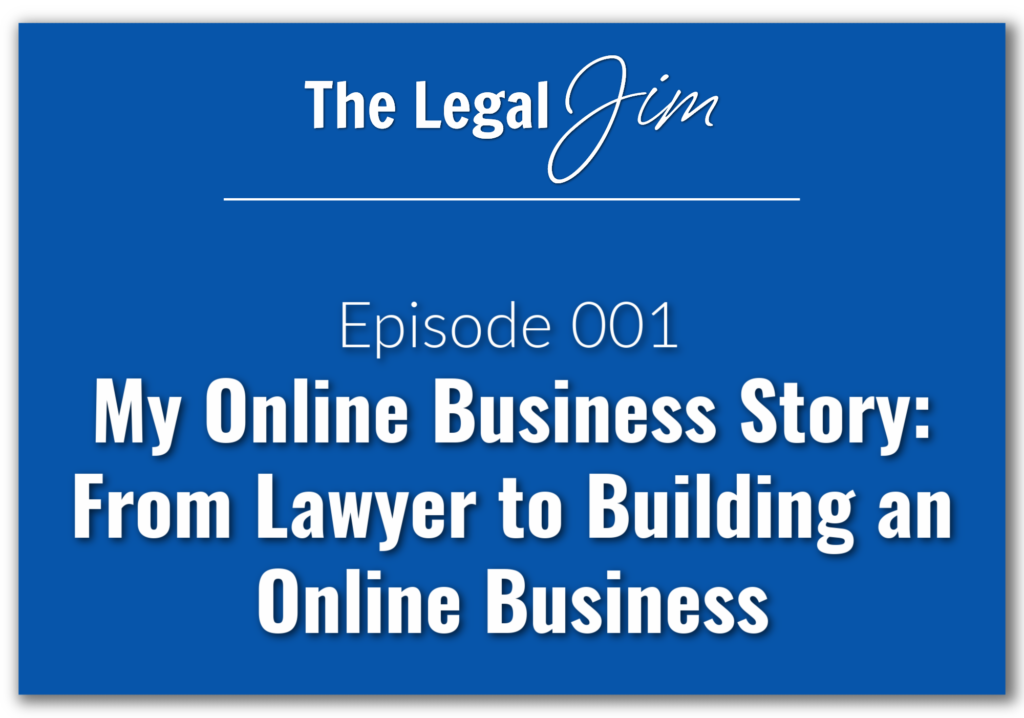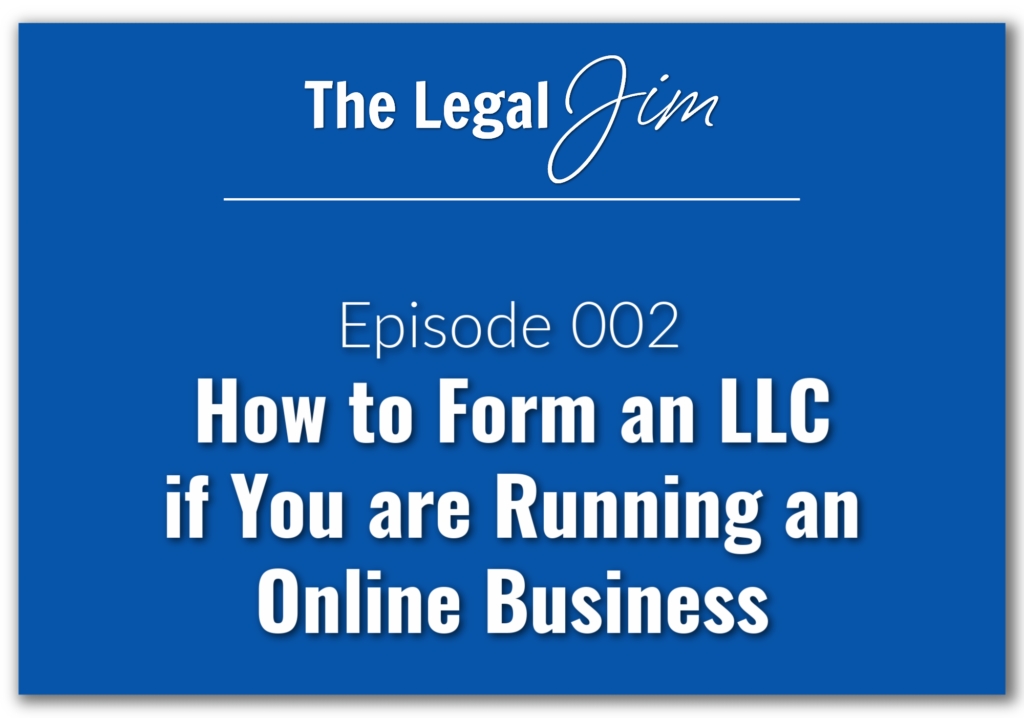This post contains affiliate links. If you click through to one of those links and make a purchase, it won't cost you anything extra but it will support my firm financially. Thank you in advance for your support!
In today’s episode of The Legal Jim we will be reviewing 8 of the most common mistakes we see people make over and over when they are setting up their LLC’s.
Everything from filing in the wrong state (and why this is BAD) to using the wrong address, to not using a Registered Agent, this episode is packed with a tremendous amount of information!
Subscribe
Apple | Google | Spotify | Stitcher | Overcast
8 Common LLC Mistakes
Many people get started in business thinking that setting up an LLC (Limited Liability Company) is the most important thing they should be doing right from the beginning.
Unfortunately, I see people make way too many mistakes when it comes to setting up and running their LLC. In today's video I outline the 8 most common mistakes I see people make with their LLC's.
#1 Filing in the Wrong State
One of the biggest mistakes I see people make is thinking that they need to file their LLC in Nevada for a “favorable business climate” or “no taxes” or Wyoming for privacy reasons or Delaware because they see all the “big businesses” filing there.
For 99% of online businesses, filing in your home state is the best option. If you think you can get out of paying taxes by filing in a state with no income tax, you are wrong. If you think that you will save money by filing in a state where the filing fees are super cheap, you are wrong.
By filing somewhere other than your home state, you are just creating more headaches for yourself. If you live in a state with an income tax, you are still going to pay taxes there. And if you file in a state other then where you live, you will just have to file in your home state anyway as a foreign entity.
Sorry if you live in a state like California or New York where it is super expensive to set up an LLC. If you don't like it, your best bet is to move to a different state.
#2 Using the Wrong Address
Each state has a different set of rules regarding what you can use as a business address. Some allow P.O. Boxes, while others require a street address. My recommendation is to check with your state to see what they require BEFORE you file your LLC paperwork.
If you are concerned about privacy, then consider using a virtual address for your business address. My personal preference is Earth Class Mail (affiliate link) and that is the company I currently use for my business address in North Carolina. But there are other options. The bottom line is that you should think this through BEFORE you file your LLC paperwork and make sure you have the right address on the forms from the outset.
Resource: My favorite virtual address service
#3 Not using a Registered Agent
Every state requires a registered agent (sometimes called a registered address or registered office) for your LLC. This is a physical office address that is available to accept legal documents and notices related to your LLC.
While you can use your home address, we do not recommend it. Your registered agent address must have someone available during normal business hours Monday through Friday to accept service of any legal documents related to your business.
Your best bet is to use a corporate registered agent. This will typically run you between $100-$200 a year and is a small price to pay for your piece of mind. My law firm has a relationship with LegalInc and can serve as your registered agent in all 50 states. Just use this link to get set up.
#4 Messing up your S-Corp Election
I see two major mistakes when it comes to making an S-Corp Election. The first mistake is filing your S-Corp election before it makes financial sense for you to do so. The second mistake is not filing in time to take advantage of this special tax election before the end of the year.
Generally speaking, if you think that your business will earn at least $25,000 to $50,000 in net profit during any calendar year, then an S-Corp election might make financial sense. If you are not earning at least that much than the costs associated with setting up your S-Corp will eat into your tax savings.
My recommendation is to speak with your tax professional to determine whether or not an S-Corp election is appropriate in your personal situation.
#5 Filing and Forgetting
It still baffles my mind how many people file their Articles of Organization for their LLC, take the filed documents and put them in a drawer, and think that this was sufficient to set up their business.
There are so many other aspects of properly setting up and running an LLC. Some of the things you need to do include:
- Obtaining an EIN
- Opening a Business Bank Account (hint… I recommend this company)
- Following the proper corporate formalities
- Doing the other things I list below
For a full list of everything you need to do to keep your LLC above board, you may want to download my Business Building Checklist.
#6 Not Using an Operating Agreement
If you don't have a proper operating agreement in place, then your LLC will be governed by the LLC model statute in your state. Do you know what that says? Probably not.
You know what is easier to follow? A simple operating agreement that governs how your LLC will be run. If there is a conflict between your state statute and the agreement, the agreement will govern.
Don't have an operating agreement? I've got you covered. Here is a lawyer-drafted template that will set you straight from my Legal Template Store.
#7 Not Properly Executing Your Contracts
Once you start an LLC, chances are you will be entering into some contracts. Those might be employment agreements, independent contractor agreements, agreements for the sale of your services or products, or even vendor contracts.
When it comes time to put your John Hancock on a legal document, make sure you are signing in your capacity as owner of your LLC. If you list yourself as the party to the agreement as opposed to the LLC, then you could be shooting your business in the foot if anything ever goes wrong.
The best way to do this is, #1 make sure your LLC is listed as the party to the agreement, and #2 make sure the LLC is listed in the signature block and you will sign as “member” or “owner”. It should look like this:
ABC Media Company, LLC
By: _________ (you sign on the line)
John Doe, Member
Make sure you also sign your name with a comma and “member” after your signature so there is no doubt about the fact that you are binding the LLC, and not yourself personally to the terms of the agreement.
*Note… Some companies, especially those that are asking the LLC to pay large sums of money or when a loan is being taken out, will ask you to sign a personal guarantee. That is the only exception where you will be binding yourself to the contract instead of the LLC.
#8 Missing Important Deadlines
Each year around tax season, your LLC will face a number of deadlines. Typically this means filing a franchise tax or paying an annual reporting fee. DO NOT miss these deadlines. Doing so could cost you fees and penalties, not to mention cause your LLC to lose its standing with the Secretary of State and cause an administrative dissolution.
You don't want those things to happen. So make sure you understand when your annual reports and fees are due for your state.
If you aren't sure, I have a course that teaches you everything you need to know to set up your LLC properly. In that course is a spreadsheet containing the deadlines and fees for all 50 states and the District of Columbia.
Conclusion
Setting up an LLC isn't easy, but it doesn't have to be difficult. With some simple planning on your part and a little attention to detail, you shouldn't have any problems making sure your business is operating safely and legally.
Don't Forget to Subscribe!



Next Steps…
Would you like to work with Jim on a deeper level?
Click here to schedule a strategy call and learn how we can help you to protect your online brand.
If you are an aspiring entrepreneur ready to join our membership now, click here.
If you need some legal templates for your online business, click here.
If you are looking for a lawyer to help you with the legal aspects of your online business, click here.
Legal Disclaimer
The content of this podcast episode is provided for informational purposes only and is not intended to constitute legal advice. You should not rely upon any information contained on this podcast episode for legal advice. Listening to The Legal Jim Podcast is not intended to and shall not create an attorney-client relationship between you and James W. Hart or The Hart Law Firm, P.A. d/b/a Hawthorn Law. Messages or other forms of communication that you transmit to this website will not create an attorney-client relationship and thus information contained in such communications may not be protected as privileged. Neither James W. Hart nor The Hart Law Firm, P.A. makes any representation, warranty, or guarantee about the accuracy of the information contained in this podcast episode or in links to other podcasts, resources or websites. This podcast is provided “as is,” does not represent that any particular outcome will result from listening to this episode. Your use listening to this podcast is at your own risk. You enjoy this podcast episode and its contents only for personal, non-commercial purposes. Neither James W. Hart, The Hart Law Firm, P.A., nor anyone acting on their behalf, will be liable under any circumstances for damages of any kind.



